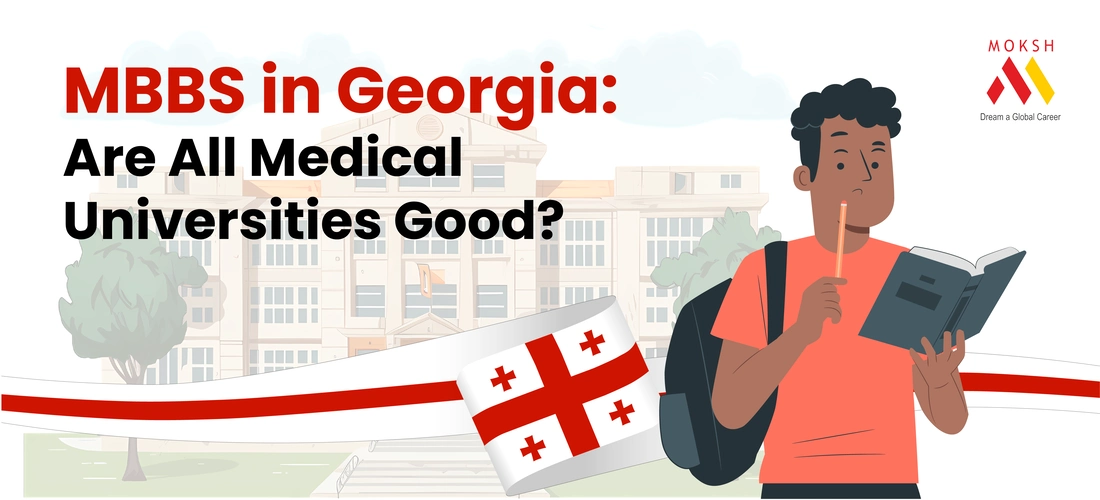
In recent years, pursuing a medical degree abroad has become popular among Indian students. Among the many options available, Georgia has emerged as a promising destination for MBBS aspirants. However, amidst the array of universities in Georgia offering MBBS programs, one pertinent question arises: Are all medical universities in Georgia truly good for pursuing an MBBS degree? Let's delve deeper into this query and uncover the facts.
MBBS in Georgia
By 2024, Georgia is home to over 18 Medical Council of India (MCI)-approved medical universities, making it a top pick for Indian students pursuing an MBBS degree abroad. With tuition fees ranging from $3,500 to $8,000 annually, Georgia stands out for its affordability compared to the US or UK. Coupled with degrees recognized globally by organizations like WHO, Georgia becomes an appealing choice for international medical students.
Why consider Georgia?
Georgia has become a favoured spot for Indian medical students due to several reasons:
- Recognition by MCI : Georgia's medical degrees hold recognition from the Medical Council of India (MCI), vital for Indian students to practice medicine back home after passing required exams.
- Cost-Effective Education : Compared to other countries, studying medicine in Georgia comes with lower tuition fees, making it more affordable.
- No Entrance Exams: Most medical universities in Georgia don't require entrance exams. Admission is typically based on the student's previous academic performance.
- English-Medium Programs : Many Georgian medical universities offer MBBS programs in English, easing the learning process for Indian students.
- Modern Facilities : Georgia's medical universities provide state-of-the-art facilities, including labs, libraries, and simulation centres. Some even have their hospitals for practical training.
- Experienced Faculty : Professors at Georgian medical universities are seasoned medical professionals who have often trained in Europe or the United States.
- Diverse Student Community : These universities attract students from around the globe, fostering a diverse and enriching learning environment.
Top Medical Universities in Georgia for Indian Students
While Georgia boasts several medical universities, not all of them necessarily offer the same education or facilities. Prospective students need to conduct thorough research before making a decision. Here's a breakdown of some of the top medical universities in Georgia that are popular choices for Indian students:
1. University of Georgia (UG)
- History & Reputation: Founded in 2004, UG is an esteemed private university for its student focus and global medical programs.
- Programs: The UG offers a six-year MBBS program in English and Georgian languages.
- Student Body: The university attracts a diverse community with 125+ nationalities, catering to over 6000+ medical students.
- Recognition: India's NMC recognizes its MBBS program, facilitating careers. Moreover, the university’s membership in EUPHA and AUPHA showcases its dedication to global healthcare standards.
- Location: It is in Tbilisi, Georgia, providing a culturally rich environment for students.
2. Tbilisi State Medical University (TSMU)
- History & Reputation: Established in 1918, TSMU is Georgia's oldest and most prestigious medical university. It boasts a strong reputation for high-quality medical education and experienced faculty.
- Programs: The MBBS program is offered in English, along with other medical programs like dentistry, pharmacy, and nursing.
- Student Body: TSMU has a diverse student body, with approximately 25% of international students from over 70 countries.
- Recognition: Recognized by MCI (Medical Council of India).
- Location: Tbilisi, the capital city of Georgia.
3. Ivane Javakhishvili Tbilisi State University (TSU)
- History & Reputation: Established in 1918, TSU is the oldest university in Georgia and is not solely focused on medicine. It has a well-established Faculty of Medicine with a good reputation.
- Programs: The MBBS program and other healthcare programs like dentistry and public health are offered in English.
- Student Body: It has a large and diverse student body, with international students, but it may not be as heavily focused on medicine as TSMU.
- Recognition: Recognition by MCI is currently under review (as of March 2024).
- Location: Tbilisi, the capital city of Georgia.
4. David Tvildiani Medical University (DTU)
- History & Reputation: Founded in 1989, DTU is a private university known for its innovative teaching methods and focus on research.
- Programs: Offers MBBS program in English.
- Student Body: The international student body primarily consists of many Indian students.
- Recognition: Recognized by MCI.
- Location: Tbilisi, the capital city of Georgia.
4. New Vision University
- History & Reputation: Established in 1995, New Vision University is a private university focusing on healthcare education.
- Programs: The MBBS program is offered in English, along with other healthcare programs like dentistry and pharmacy.
- Student Body: Primarily international student body.
- Recognition: Recognized by MCI.
- Location: Tbilisi, the capital city of Georgia.
5. European Teaching University
- History & Reputation: Established in 2005, European University is a private university with a developing medical program.
- Programs: Offers MBBS program in English.
- Student Body: Information on the student body, specifically international students, is limited.
- Recognition: Recognized by MCI.
- Location: Tbilisi, the capital city of Georgia.
6. Batumi Shota Rustaveli State University (BSRSU)
- History & Reputation: Established in 1994, BSRSU is a public university with a growing medical program.
- Programs: Offers MBBS program in English.
- Student Body: Information on the student body, specifically international students, is limited.
- Recognition: Recognized by MCI.
- Location: Batumi, a coastal city in southwest Georgia.
Accreditation and Recognition
A crucial consideration for Indian students is whether the medical university they choose is recognized by the Medical Council of India (MCI). This recognition is necessary for Indian students to practice medicine in India after completing their studies and passing the qualifying exams.
Here are some of the top medical universities in Georgia that the MCI recognizes:
- University of Georgia (UG)
- Tbilisi State Medical University (TSMU)
- David Tvildiani Medical University (DTU)
- Ilia State University (ISU)
- Akaki Tsereteli State University (ACTSU)
- Batumi Shota Rustaveli State University

Admission Process and Eligibility Criteria
The admission process for medical universities in Georgia varies depending on the university. However, some general eligibility criteria include:
- A high school diploma or equivalent with strong grades in science subjects (biology, chemistry, physics)
- NEET qualification (may not be required by all universities)
- English language proficiency test (IELTS or TOEFL)
Cost & Affordability
- Tuition Fees: Compared to other popular MBBS destinations, Georgia offers significantly lower tuition fees. The average MBBS program in Georgia costs between $3,500 and $8,000 per year.
- Living Expenses: The overall cost of living in Georgia is lower than in many Western countries. Here's a sample breakdown (estimates may vary):
- Student Accommodation: $200 - $400 per month
- Food: $150 - $250 per month
- Transportation: $50 - $100 per month
Recognition & Eligibility
- MCI Recognition : As of March 2024, there are 18 medical universities in Georgia recognized by the Medical Council of India (MCI). This recognition is crucial for Indian students to practice medicine in India after completing their studies and passing the qualifying exams (e.g., NEET-PG).
- No Entrance Exam: Unlike some countries, many medical universities in Georgia do not require a separate entrance exam for admission. Selection is usually based on the student's previous academic record, primarily focusing on science subjects (biology, chemistry, physics).

Visa & Permanent Residency in Georgia
- Visa Approval Rate: Georgia is known for its high visa approval rate for Indian students. Hence, it simplifies the application process compared to some other countries.
- Permanent Residency Pathway: Some universities may allow students to begin applying for permanent residency in Georgia after their third year of study.
While Georgia offers promising prospects for Indian students pursuing an MBBS degree abroad, not all medical universities in the country meet the desired standards. Prospective students should carefully evaluate factors such as accreditation, facilities, faculty expertise, and student feedback to make informed decisions about their medical education.
Career Options After MBBS in Georgia
Obtaining an MBBS degree in Georgia opens doors to exciting possibilities in the medical field. Here's a glimpse into your potential career paths:
Practising Medicine in Georgia:
- Licensing: After completing your MBBS program, you must pass the Georgian Medical Licensing Exam to practice medicine in Georgia.
- Hospitals and Clinics: Georgia offers opportunities to work in government hospitals, private clinics, or specialized medical centres.
- Language Skills: Proficiency in Georgian will be an advantage, especially for patient interaction and navigating the healthcare system.
Returning to India to Practice:
- NEXT Exam: After completing an MBBS in Georgia, you must qualify for the National Exit Test (NEXT) conducted by the National Medical Commission (NMC) to practice medicine in India.
- MCI Recognition: Ensure the MCI recognizes your chosen university for a smooth transition to practising in India.
- Career Opportunities: India has a growing demand for qualified doctors. You can explore opportunities in government hospitals, private practice, or specialize further.
Pursuing Postgraduate Studies (PG):
- Specialization: An MBBS degree is your foundation. You can pursue a PG program in India or abroad to specialize in a specific medical field (e.g., paediatrics, cardiology, neurology).
- Research Opportunities: Georgia and other countries offer research programs that can boost your knowledge and expertise.
- Career Advancement: Earning a PG qualification can open doors to advanced practice, teaching positions, or research careers.
Alternative Medical Careers:
- Public Health: Your medical knowledge can be valuable in public health initiatives, disease prevention, and healthcare policy.
- Medical Writing or Editing: With your medical background, you can contribute to medical publications, write patient education materials, or work in the pharmaceutical industry.
- Medical Education: You can share your knowledge by becoming a medical instructor or pursuing a career in medical education.
Conclusion
Are you considering MBBS in Georgia? Partner with MOKSH Overseas Education Consultants for expert guidance. Our experienced team streamlines the application process, offers support, and helps secure student accommodation. With in-depth knowledge, MOKSH aligns your academic goals with the right Georgian university. Take the next step towards your medical career—contact MOKSH for a free consultation and turn your dream of studying MBBS in Georgia into reality!






.webp)
